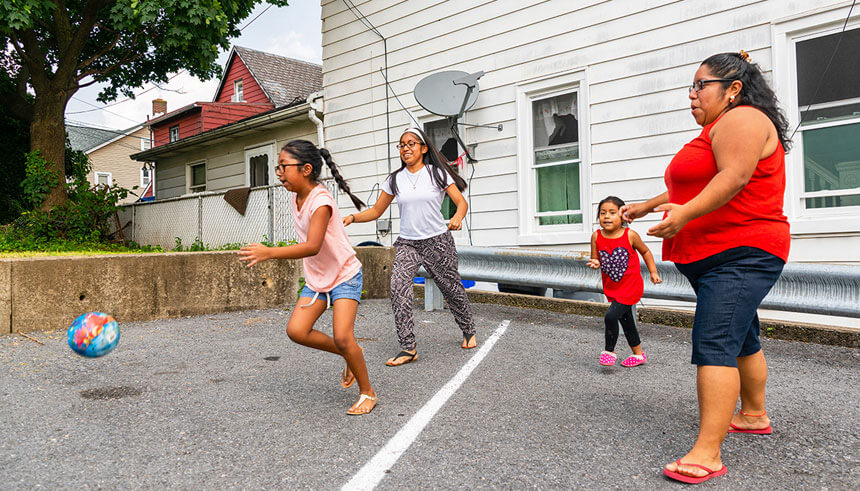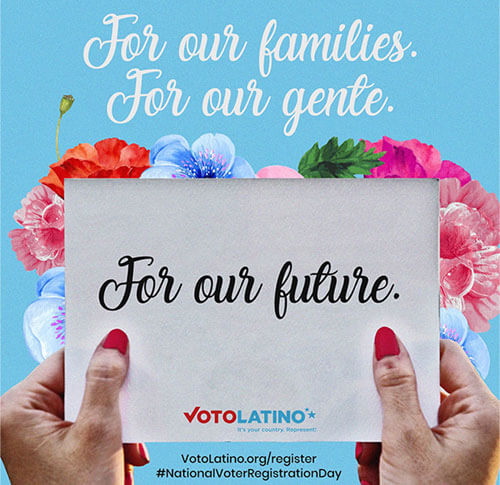East West Lifestyle
Helping Immigrants Survive the Pandemic and Mobilizing the Latino Vote
By Melody Yuan

How Voto Latino’s Immigrant Neighbor Fund provides a financial lifeline for communities impacted by COVID-19 and left out of the CARES Act
With COVID-19 numbers continuing to soar despite the rollout of vaccines, businesses remain in limbo as normalcy has yet to return. Almost a year after Congress responded with the Coronavirus Aid Relief and Economic Security (CARES) Act that pushed out the first Paycheck Protection Program (PPP) loans to businesses, the federal government passed yet another stimulus package in December that includes $284 billion for renewed PPP loans.
But what about those who are unable to qualify for financial assistance from the CARES Act? For the many immigrants and workers who lack Social Security numbers, the situation has been dire. “There has been great emotional impact in our communities during this pandemic,” says Daniel Navarro, vice president and branch manager at East West Bank. “From fear, to uncertainty around their personal and business financing, to not knowing how to ask for help since so many financial institutions are getting overwhelming demand for loans right now.”
According to Pew Research, immigrants made up 17% of the total U.S. labor force in 2017, and “unauthorized immigrants” made up 4.6% of that number. To help this substantial group of workers who have been overlooked by the CARES Act, the Immigrant Neighbor Fund was created through a partnership between Voto Latino Foundation, Mission Asset Fund, and the Asian and Pacific Islander American Vote (APIAVote).
The Immigrant Neighbor Fund started with a goal of raising $4 million to support immigrants and their families across California and Texas. East West Bank has donated $1 million to the fund.
“The Immigrant Neighbor Fund is a project that we undertook with East West Bank in the immediate aftermath of COVID, after seeing how the federal government excluded undocumented workers from the CARES Act and other forms of relief packages,” says Danny Friedman, managing director of Voto Latino. “We felt the need to do something.”
Helping struggling neighbors during difficult times
It hasn’t been easy for immigrants to ask for help, especially if English isn’t their first language. “A very well-known and respectable taco business approached me for some financial guidance when they couldn’t receive it from their previous financial institution,” says Navarro. “They came in asking about the PPP loan, but it was after the cutoff period, so I made it a point to sit down with them, go through their scenario and weigh financial options, as they were very desperate. In the end, I recommended for them to apply directly for the Economic Injury Disaster Loan (EIDL), and we’re scheduled to help them open their first business account and merchant services.”
For those who haven’t been able to receive financial guidance from a banker, the Immigrant Neighbor Fund has been a direct financial lifeline. Within weeks of the fund’s launch in May, more than 1,000 applicants had been approved, each eligible to receive $500.
“The Immigrant Neighbor Fund is a project that we undertook with East West Bank in the immediate aftermath of COVID.”

Qualifying for the Immigrant Neighbor Fund
To qualify as a recipient, individuals must show that they are not eligible for coronavirus relief under the federal government’s CARES Act, earned less than $99,000 or had a total household income under $198,000 in 2019, and experienced a disruption to their income as a result of the pandemic. Applicants must also have a valid ID, email address and a checking account to ensure that no bots get into the system. Once approved, the money is deposited directly into the recipient’s account.
The application is available in 20 languages, and those interested in applying or donating to the fund can do so here.
One recipient named Mayra H. left a testimonial saying, “I have three kids, my work laid me off because of this pandemic... Our lease of the apartment is under somebody else’s name, and because of that, we don’t qualify for rent relief.”
Despite never being late on bills prior to the pandemic, the bills kept mounting after she was laid off. Mayra H. continued: “I called several shelters that maybe can receive us, but they are all closed. Our family has never needed [sic] in this situation, we feel so lost, but when I was applying through this application, I feel the hope. Thanks so much for that.”

Voto Latino’s tangible impact
“Our community was hit hard by the pandemic, both in terms of health and greater exposure to economic uncertainty,” says Friedman. “Many of the frontline workers, gig workers and health care workers are represented by people of color, so there has been a big effort to reach out and help.”
Voto Latino is a grassroots political organization that focuses on educating and empowering a new generation of Latinx voters, while building a more inclusive democracy. “We’re a digital-first organization. And since the organization first began almost 16 years ago, we’ve been using innovative organic content that’s culturally relevant and speaks to our community,” says Friedman.
From leveraging celebrities such as Camila Cabello and Rosario Dawson, and even campaigning on dating apps, the message has been loud and clear. Voto Latino succeeded at registering more than 601,000 voters for the 2020 election cycle and raised an estimated $33.7 million in a historic campaign. “With everything that happened in 2020, people wanted to be heard, and the message everywhere was to go and vote,” says Friedman.
Some believe that California Secretary of State Alex Padilla’s nomination to fill the U.S. Senate seat vacated by Vice President-elect Kamala Harris is a significant result of Latinx voter turnout. Latinx people, the second-largest voting bloc in the country, are beginning to see a rise in government representation.
“For years, investment in our community was very low, and there was a vacuum that needed to be filled,” says Friedman. “That’s why our work is so critical and why we’re so proud to work with other partners like APIAVote, NAACP and other groups that speak about the investment needed in communities of color.”
Sign up for the Reach Further Newsletter
We’ll keep you in the know about the latest US-Asia business news and trends.
Suscríbase al boletín Reach Further
Lo mantendremos informado sobre las últimas noticias y tendencias comerciales entre Estados Unidos y China.

